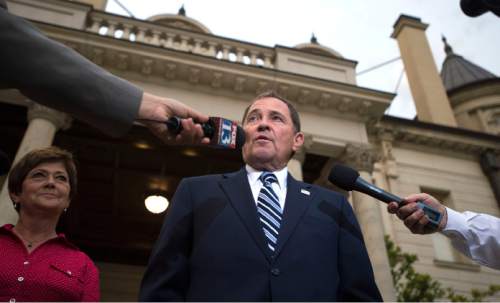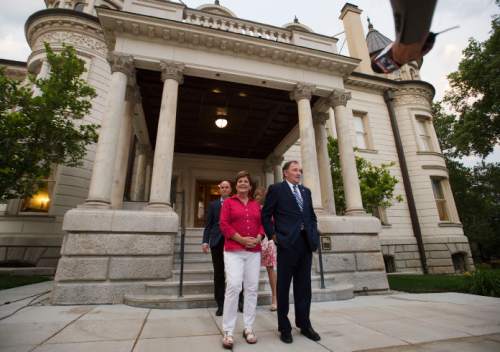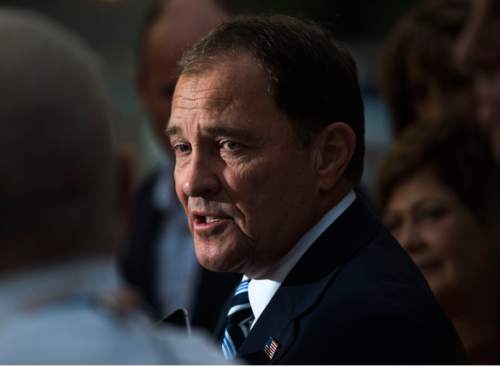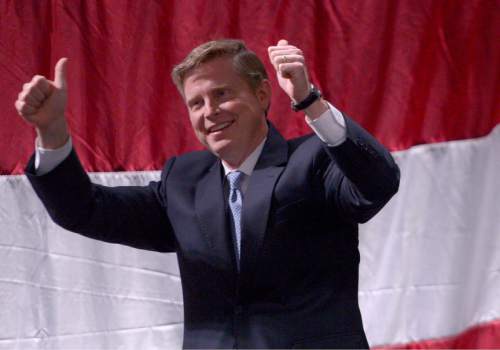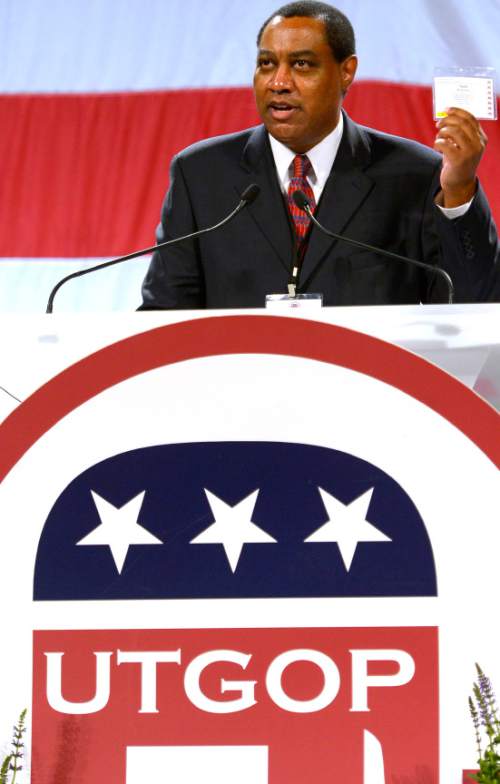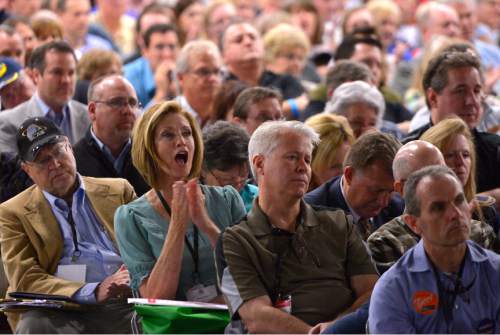This is an archived article that was published on sltrib.com in 2016, and information in the article may be outdated. It is provided only for personal research purposes and may not be reprinted.
Gov. Gary Herbert planned to spend a few days savoring a landslide victory over Overstock Chairman Jonathan Johnson, but fallout from the primary trouncing has some questioning whether there are fundamental flaws in the state's traditional nominating conventions.
It was at the state Republican convention in April that Johnson upset Herbert, winning the backing of 55 percent of the 4,000 Republican delegates who were chosen by GOP faithful to represent the average caucusgoers and choose the favorite candidates.
But Herbert's unofficial 44-point victory among the broader pool of Republican voters Tuesday could point to a fundamental disconnect between voters and their elected delegates, and major flaws in the convention system, according to Damon Cann, a political scientist at Utah State University.
"That's the biggest lesson learned from this election — yet another example of substantial differences in the preference of the state delegates and the preference of members of the Republican Party," said Cann. "Something is breaking down in terms of those delegates representing the people in their neighborhoods who elected them, because it doesn't match. It just doesn't."
—
Voters' voices • Other races further down the ticket also point to the inconsistency. Dan Hemmert, for example, lost to former state Rep. Morgan Philpot at the Utah County GOP convention, 54 percent to 46 percent. But on Tuesday, Hemmert beat Philpot by more than 20 points.
Rep. Brian Greene soundly defeated challenger Xani Haynie, 68 percent to 32 percent, at the same county convention and would have knocked her out of the race, but Haynie gathered enough signatures under a new law to qualify for the primary ballot and Tuesday gave Greene a much closer race, losing by only 5 percentage points in unofficial results.
Likewise, in Davis County, political newcomer Randy Elliott, whose campaign would have been ended at the county convention were it not for his signature-gathering, defeated Kaysville Mayor Steve Hiatt by 9 percentage points.
How does the party account for such disparities between the will of the delegates and the voice of the voters?
Utah Republican Party Chairman James Evans said looking at a few election results dramatically oversimplifies the political reality.
"While we know there will be some who try to use the governor's example to say the delegates are out of touch, the bottom line is that Gary Herbert's race is a unique situation and you have to remember, the man is a rock star," Evans said.
Evans notes that nearly all of the signature-gathering candidates who were backed by Count My Vote — a group pushing primaries over conventions to decide party nominees — lost their elections.
"If you choose not to be intellectually honest, it's a good talking point for Count My Vote … even if it has little to do with the more complex reality," Evans said. "For heavens sake, we had 95 percent of the convention [winners] sustained by the primary voters. How much more compelling evidence do you need?"
All five legislative candidates who qualified for the ballot only because of signature-gathering were defeated or appeared to be headed for defeat according to unofficial results.
—
Retail politics • In a convention, there are fewer delegates for candidates to court, meaning they can make direct contact with most, if not all of them, and the delegates are engaged and willing to listen, Evans argues.
In a primary, where candidates have to talk to tens of thousands, if not hundreds of thousands of voters, candidates have a harder time reaching voters — especially challengers like Johnson, who are often unknown, underfunded and have to convince people why they should vote out an incumbent.
Evans rejects "this whole narrative that the delegate vote has to somehow equal the primary vote, when it's much more complicated, especially when you have a candidate who can't get his message out as effectively as the incumbent."
Dave Hansen, a longtime Utah political operative and campaign manager for Johnson, said his candidate was able to make his case to the smaller pool of delegates who wanted to hear what he had to say leading up to the convention.
In the primary, the campaign was hamstrung, left with little money to try to reach a much broader audience of voters in a short time frame when Utahns were busy with school graduations and summer vacations and had anything but politics on their mind.
"Consequently, people are, to a certain degree, less informed than you would like them to be and that especially hurts a candidate who is kind of an unknown as Jonathan was," Hansen said. "The simple fact is that Gary Herbert is popular in this state, we knew that going in. … Trying to create that reason for change is a massive project, especially when voters are not really focused on politics or the upcoming election."
—
Choices, priorities • But Rich McKeown, co-chairman of Count My Vote, whose efforts in 2014 led the Legislature to create the signature-gathering path to the ballot, said demographics and surveys prove that the convention delegates don't reflect the broader Republican electorate.
Less than a quarter of delegates are women, compared to 54 percent of GOP voters and delegates tend to be older than the average voter, McKeown said.
Research by the Utah Foundation found that the most important issues for Republican delegates are states rights and taxes, while GOP voters generally were most concerned about health care and education.
"It's pretty evident that if you leave it to a set of caucus insiders, delegate insiders, that their selections may be different than the choices that the general population makes, and that is evident in how wide the margin was in the governor's race," McKeown said. "It's not reflective of the population."
The good news, McKeown said, is that because of Count My Vote and SB54, there is now another way for candidates to get on the ballot.
"We feel really darn good about the fact that people got involved," McKeown said. "If you just look at it, the Republican Party did everything they could do to suppress interest in gathering signatures and I feel the future is pretty bright for signature gathering. I think there will be a lot more in the next election cycle and the voters responded to it well and they made selections."
McKeown contends it's not just about wins and losses.
"The fact that there were candidates on the ballot who otherwise might not have been, there is really the victory," he said. "There are more primaries, more candidates, more choices and the consequence of that has to be that we'll have better government."
Twitter: @RobertGehrke


